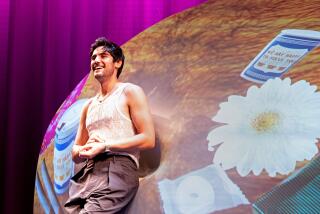Review: ‘Toni Morrison: The Pieces I Am’ powerfully profiles beloved writer
The remarkable documentary “Toni Morrison: The Pieces I Am” does so many things so well that it’s often like watching several fine films at once. Look for this one to be front and center in its category come Oscar time.
Timothy Greenfield-Sanders, with his extensive, acclaimed background in portrait photography and documentary filmmaking — plus a 38-year friendship with Morrison — proves an ideal choice to direct a film that explores and celebrates the much-loved and lauded literary figure with artistry, gravitas and grace.
This moving and profound portrait serves as a fitting biographical tribute as well as a piercing, often painful recount of African American history from slavery and the Civil War to the Jim Crow era, the Civil Rights movement and beyond.
To have the towering Morrison, now 88, willing to face your cameras — head on, in fact — and tell her story as candidly, heartily and humanely as she does here, is a singular gift that keeps on giving throughout the film’s two captivating hours. She’s a woman as seemingly proud of her carrot cake recipe as she is of her writing.
These interviews with Morrison, shot in 2016 and 2017, are pretty incomparable, though clips of her appearances opposite such erstwhile TV talk show hosts as Dick Cavett, Charlie Rose and Bill Moyers still pack a punch.
Well-paced and deftly structured, the doc presents its rich and lucid look at Morrison’s personal and literary past by largely, but not entirely, adhering to chronology. Greenfield-Sanders often flips back to certain times, places and images to highlight a point by Morrison or one of her many friends, peers and observers who weigh in here. It proves a distinctive approach both visually and narratively.
With an eye on our nation’s prevailing cultural zeitgeist, the filmmaker tracks the writer’s early days (Ohio upbringing, growing awareness of books and the power of words, Howard University education, introduction to segregation, tales of her parents and grandparents), post-college life (failed marriage, two sons, jobs as teacher and textbook editor) and, in the late 1960s, her move to New York to edit for Random House.
At the venerable publishing firm, Morrison became known for her ability to stay unusually objective about the material she would so keenly edit as well as for the new female African American writers she brought into the fold: Toni Cade Bambara, Gayl Jones, activist Angela Davis and others. In addition, she notably developed and edited “The Black Book,” a bestselling anthology of African American history.
While she was at Random House, Morrison also wrote her debut novel, “The Bluest Eye.” It became the first in her celebrated canon of deeply affecting and unflinching books involving the black — often black female — experience, and written, as she pivotally explains here, without the weight of “the white gaze.”
The doc intriguingly examines such subsequent novels as “Sula,” “Song of Solomon,” “Tar Baby” and, especially, her 1987 masterwork “Beloved,” which earned Morrison the Pulitzer Prize and was made into a 1998 film starring Oprah Winfrey. The media mogul-actress, who widely promoted the author via her TV talk show’s popular “Oprah’s Book Club” segment, enjoyably comments here with her signature gusto.
Also offering wise, deep and admiring perspective on Morrison are an esteemed array of writers, critics and scholars including Davis, Paula Giddings, Walter Mosley, Sonia Sanchez, Hilton Als, Russell Banks, Fran Lebowitz, Farah Griffin and David Carrasco; plus composer Richard Danielpour and Morrison’s longtime editor — and former publishing chief — Robert Gottlieb.
In addition to using a strong and evocative range of archival clips and photos, Greenfield-Sanders and editor Johanna Giebelhaus include a stunning collection of African American artwork (by Jacob Lawrence, Kerry James Marshall, Kara Walker, Charles White and others) that, by design, is more emotionally reflective than illustrative. It’s a master stroke.
Footage of Morrison visiting Sweden in 1993 to collect the Nobel Prize in Literature as well as coverage of her receiving the Presidential Medal of Freedom in 2012 from Barack Obama are additional highlights.
An animated opening collage of Morrison images by artist Mickalene Thomas is also superb. So is the score — with its memorable use of fiddle, violin and upright bass — by Kathryn Bostic.
“Toni Morrison: The Pieces I Am,” whose subtitle is drawn from a passage in “Beloved,” should not only inspire viewers to read or revisit Morrison’s novels but also motivate artists to strive for authenticity and autonomy in their work, tell unfamiliar stories and, perhaps most importantly, “love yourself first.”
-------------
‘Toni Morrison: The Pieces I Am’
Rated: PG-13, for some disturbing images/thematic material
Running time: 1 hours, 59 minutes
Playing: Starts June 21, ArcLight Hollywood; The Landmark, West Los Angeles
------------
More to Read
Only good movies
Get the Indie Focus newsletter, Mark Olsen's weekly guide to the world of cinema.
You may occasionally receive promotional content from the Los Angeles Times.










